How do I generate a list of New Testament quotations in the Early Church Fathers?
The Passage Guide has an Ancient Literature section that will show quotes from particular passages.
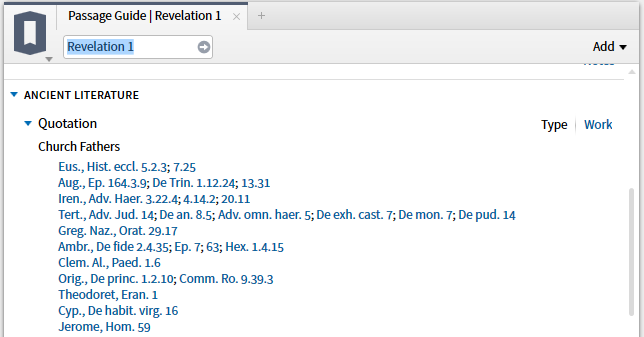
The downside is that you need to know which passage you're looking for. The example above is quotations from Revelation 1. You could create a custom passage guide with just the Ancient Literature section if you wanted to work on large portions of the NT (e.g. whole books).
There are a number of ways of going about this depending on what packages / services you have.
Assuming you have the "Fathers" resources (such as Ante/Post-Nicene Fathers) you can search for references in each volume.
In the example below I am searching for all references to Matthew's gospel (using <matt> in ANF1). You can expand this for the entire Bible (<gen-rev>) but it might take a bit longer to run. Do this for all volumes and you are done.
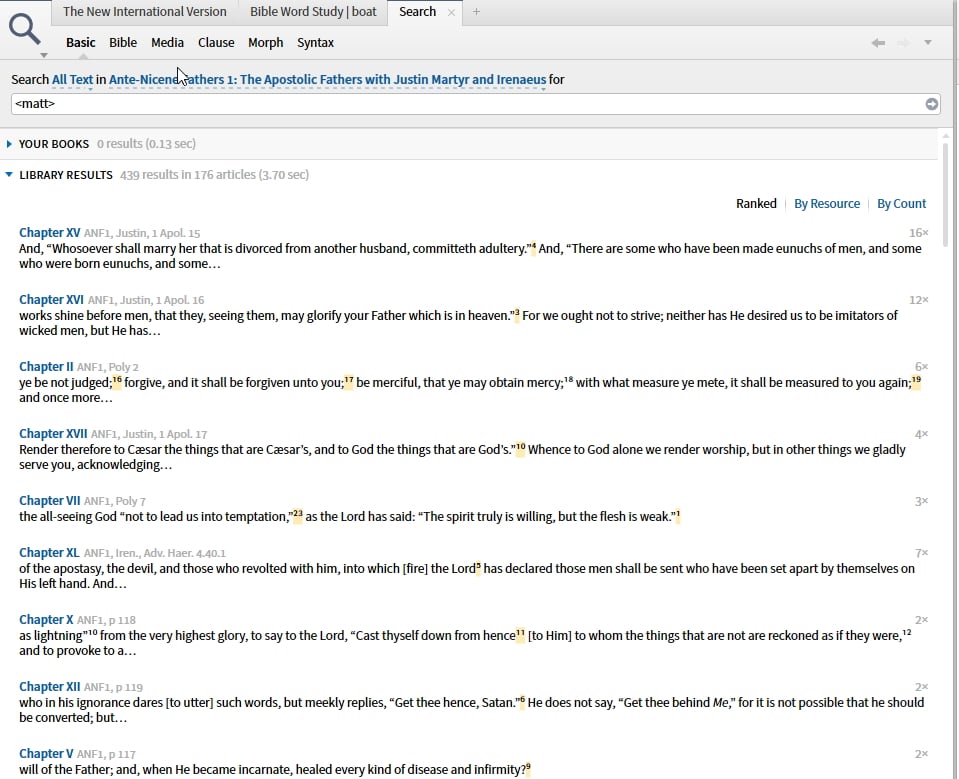
You can search all volumes at the same time by creating a "quick collection" for all of them - in the example below I entered "series:nicene" in the filter and selected the 59 corresponding resources
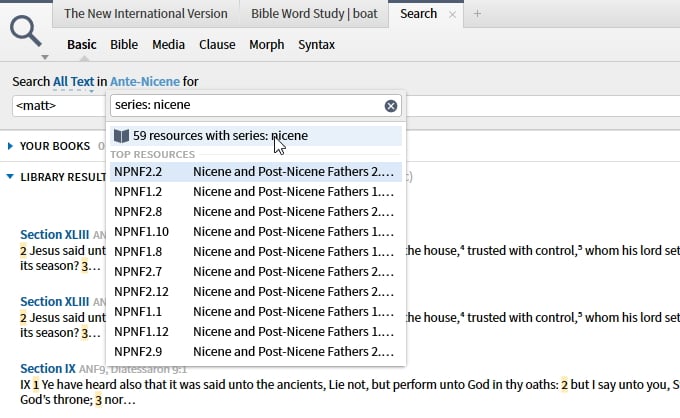
which gave me
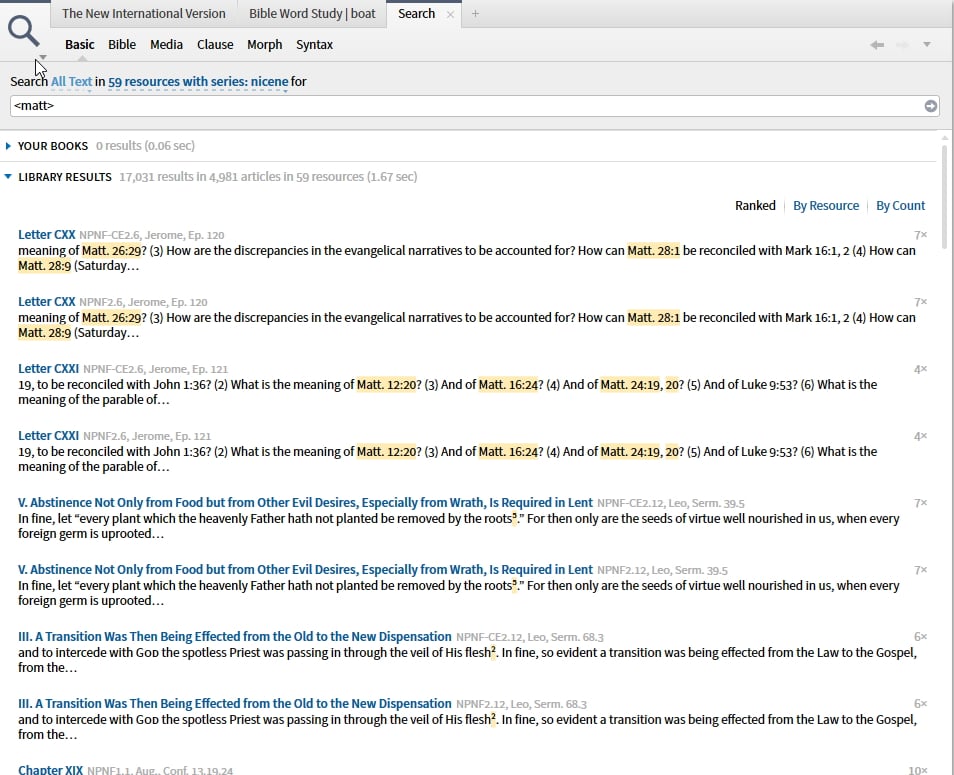
Another approach is using the Concordance. Please note this only works if you are a Logos Now subscriber
Here I am using ANF1 (the Concordance only currently supports one resource at a time) and looking at biblical references
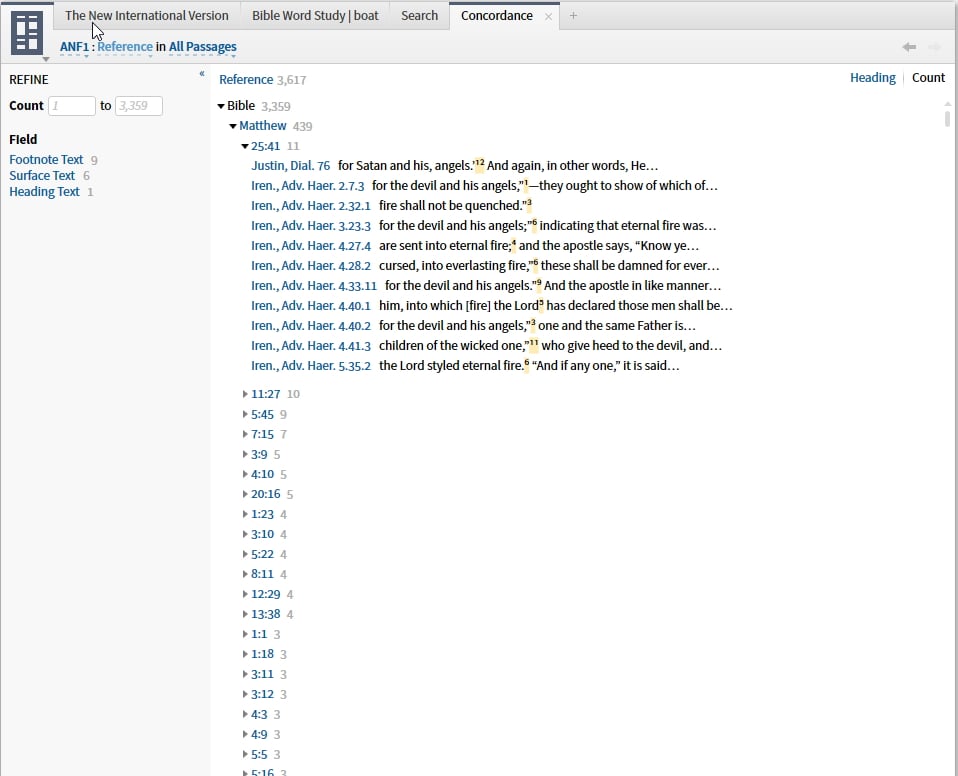
Where can I find the book of Jeremiah organized chronologically?
I believe I saw this years ago in the forum, but does anyone know if Jeremiah has been put in chronological order (and if Kings, Chronicles, Daniel, and Ezekiel contemporary history were included that would be an even greater asset). The chronology that I have is:
Jeremiah chronology
- Josiah (640–609): chs. 1–6; 14–16.
- Jehoiakim (609–598): chs. 17; 7–11; 26; 35; 22:1–19; 25; 18–20; 36:1–4; 45; 36:5–32; 12.
- Jehoiachin (598–597): chs. 22:20–30; 13; 23.
- Zedekiah (597–586): chs. 24; 29–31; 46–51 (?); 27; 28; 21; 34; 32; 33; 37–39.
- After the fall of Jerusalem (586 - ): chs. 40–44; 52
Books similar to this provide what you want:
Gagnon, Richard M. Footsteps through the Bible: A 52-Week Chronological Bible Reading Plan & Study Reference. Alresford, Hampshire: John Hunt Publishers Ltd, 2000.

or
Jackson, Jeffrey Glen. Synopsis of the Old Testament. Bellingham, WA: Logos Bible Software, 2009.

or
Geneste, Maximilian. The Parallel Histories of Judah and Israel, with Copious Explanatory Notes. Vol. 2. London: Samuel Bagster and Sons, 1843.

How can I "save" the highlights of a search?
you can convert your search easily into a Visual Filter which will highlight all the results at once.
To be precise, the highlighting done by visual filters is neither temporary nor permanent - it's dynamic. In other words, the highlighting is applied via a search criteria. That criteria and associated highlighting style is saved in a permanent visual filter document. So long as you don't delete the document, and the content of the resource doesn't change, then the highlighting will remain indefinitely (though you can temporarily turn it off, as Mick said).
Here's an example from my library, which is not dissimilar to your own:

How do I share a note file with a friend?
If you mean via http://documents.logos.com/, then yes it will. Create a group with you and your friend. Choose "Publish" in documents.logos.com, then have your friend get the document from the Faithlife group. It will copy it into his version of Logos. Note that the two files won't stay synced in this case. He'll receive a copy of the file as it was when you published it.
How do I use Grammatical Relationships to learn to build Syntax Searches?
I tried to look for instances of υἱός used adjectivally with θεός ... Strangely, John 1:34, for example, appears in my syntax search but NOT in Grammatical Relationships. Is there a grammatical reason why this verse is excluded?
There are textual variants on this verse as:
ὁ ἐκλεκτὸς τοῦ θεοῦ
And I have seen and testify that this one is the Chosen One of God.
One very early manuscript and a few other early witnesses have “the Chosen One of God,” but most other early and later witnesses have “the Son of God.” Both titles refer to the same person, so there is no great difference in understanding the passage. The difference is largely found in what is emphasized by the expression, whether the chosen status of Jesus or his divine sonship.
Rick Brannan and Israel Loken, The Lexham Textual Notes on the Bible (Lexham Bible Reference Series; Bellingham, WA: Lexham Press, 2014), Jn 1:34.
So some texts include the word υἱός and some don't
Opentext does - which is why the Syntax search works

but Cascadia doesn't

I guess you are using Cascadia in the BWS Grammatical relationships section which is why you don't get any results
If you change this to use OpenText

you will get it in the BWS

After much trial and error, I managed to construct the following syntax search that returned the same results as Grammatical Relationships:

This seems to work on any scenario where a word is used adjectivally with another word. I've tested "Son of Man," "his son," "kingdom of God" and "kingdom of heaven" and the results were all identical with those returned by Grammatical Relationships.
If anyone can think of a way to simplify this search diagram, that would be awesome!
If anyone can think of a way to simplify this search diagram, that would be awesome!
Sometimes simple looks to be verbose but you could have a diagram without the OR:-
Head Term ---> Modifier (may or may not be present) ---> Unordered ---> etc.
How do I create a verse list based on a Strong's number?
- Do a Bible search on a bible: <G2889>, <H1440>
- Click the Search menu and select "Save as Passage List"
How do I search a single article or essay in an anthology?
Yes - milestone searches provide this capability.
The first requirement is to work out what the milestone is. Open the resource to the article and right-click on one of the words near the beginning. Then select the article (in the right-hand menu) and choose search on the left

This creates a search with the Milestone term

Then build the search around it with the search terms you are interested in:
- have the search term at the beginning
- follow it with the operator "WITHIN"
- and enclose the actual milestone with {MILESTONE }

Where could I find a list of the values of the library type field?
In Library, be sure the "Type" column is showing. Then sort by that column and a complete list of types will appear (with the resources associated with each nested within each type). You can use any of these.
If you're using types that are made up of two words, you'll need to replace the space with a hyphen, or wrap it in quotes.
So it's type:bible-commentary or type:"bible commentary".
Is it possible to get the search to look for two words across more than one verse?
A bible and morph search will always find words occurring in the same verse.
A basic search on a Bible will find words occurring in the same chapter.
A clause search will find words occurring in the same clause.
A syntax search can be used to find words occurring in the same syntactic block (of varying lengths).
How can I duplicate a Visual Filter?
You can copy a visual filter document at https://documents.logos.com/
You can get there from the resource menu in the Visual Filter document:

You can copy a visual filter document at https://documents.logos.com/
You can get there from the resource menu in the Visual Filter document:

If I mark a thread in the forums as being a "Favorite", how do I find those favorites in the future?
Click on your username, upper right hand corner of forum page. (near "edit" and "sign out").
Or on your avatar
How do I get a Bible reference in my notes to become a hyperlink?
When typing a Bible reference in Notes, make sure that you type a space after the reference.
In addition you have to make sure that you are using a recognized short form. Here are some samples below to show which ones work and which do not. In the samples below the long forms all work and some short forms work but ones that are not capitalized do not work.
